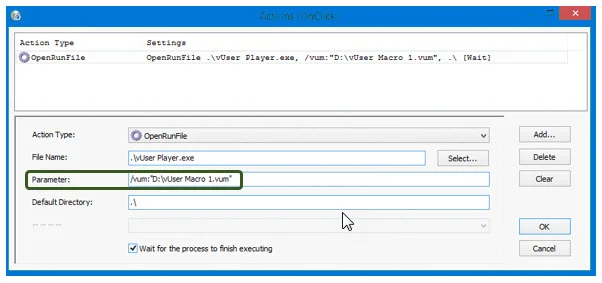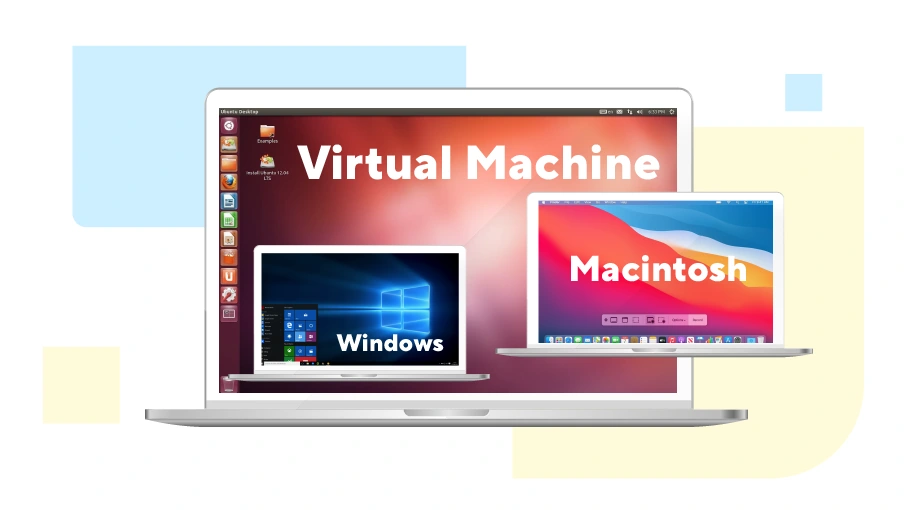the v-User Player Program Manual
Table of content
About the Player Application
The name of this application is the vUser Player, and its icon looks like a green hand (
 ).
This application runs the commands that are saved in a Macro file.
).
This application runs the commands that are saved in a Macro file.
The Main Window the Player Application
When we open the Player application, its main window is going to open; this window looks like this:

Changing the Language of the Player Application
The Virtual User Software is delivered in English and Persian languages.
If you want to change the language of the application, you can click on the “Setting”
( )
button, and select the language that you want from the “Language” sub-menu.
)
button, and select the language that you want from the “Language” sub-menu.
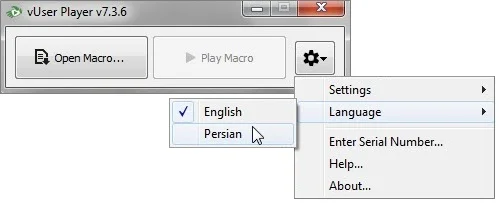
Opening the Macro in the Player Application
To open the Macro files, you can use the “Open Macro”
 button, and you can use the “Play Macro”
button, and you can use the “Play Macro”
 button to run them.
button to run them.

Running the Macros in the Player Application
To open the Macro files, you can use the “Open Macro”
 button, and you can use the “Play Macro”
button, and you can use the “Play Macro”
 button to run them.
button to run them.

The Player Application Settings
This option has two sub-menus:
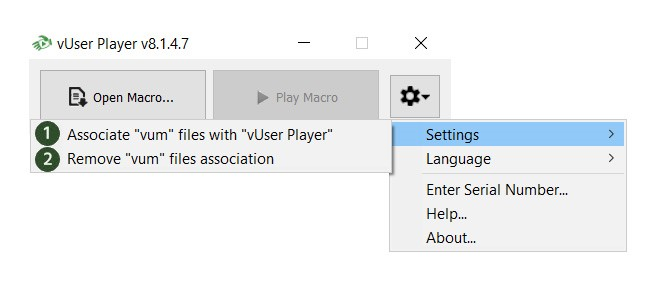
 Associate “vum” files with “vUser Player”:
By clicking on this option, if you double click on the Macro file, they will be opened with the Player application.
Associate “vum” files with “vUser Player”:
By clicking on this option, if you double click on the Macro file, they will be opened with the Player application.
 Remove “vum” files association
Remove “vum” files association
Associating VUM files with the Player Application
By selecting this option in the Player application, the icon of all the Macro files
will change to a green hand ( ).
After that, if you double click on a Macro, the Player application will open automatically and run it.
).
After that, if you double click on a Macro, the Player application will open automatically and run it.

Enter Serial Number in the Player Application
By clicking on this option, a window will open and you can enter the serial number of the Player application.
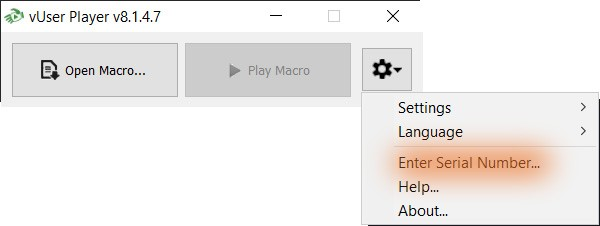
The Help of the Player Application
By clicking on this option, and you can see the help files of the Player application.
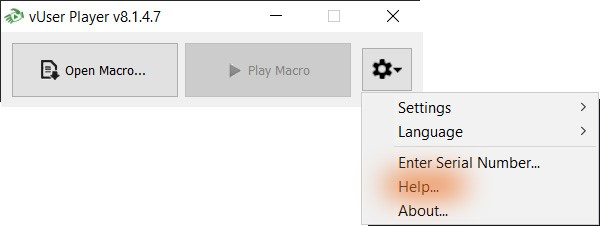
About Menu in the Player Application
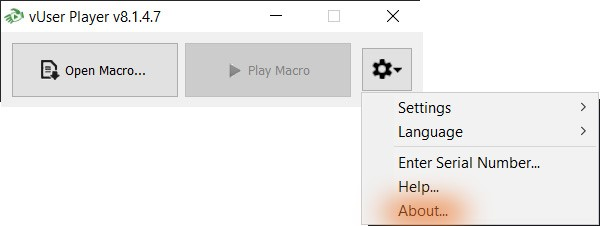
By clicking on this option, a window will open that contains the information about the current version of the Player application:
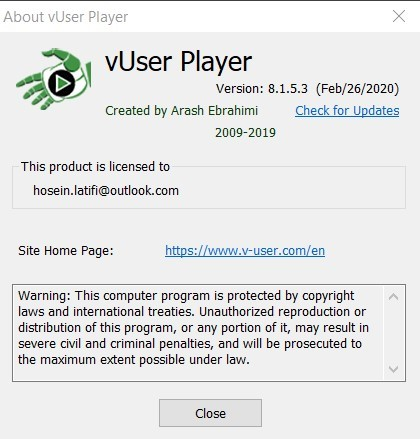
Removing VUM files Association with the Player Application
By clicking on this option, the VUM files will no longer
be associated with the Player application, and their icons will change back to the default image
( )
After that, you can not open them by double-clicking on them.
)
After that, you can not open them by double-clicking on them.
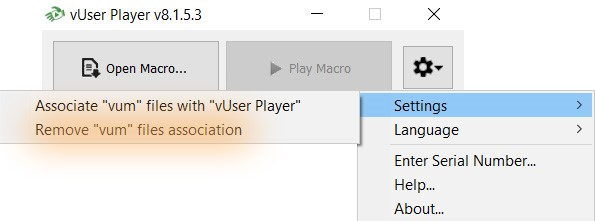
Introducing the Running Mode of the Player Application
When the Player begins to run a Macro file, the Running window will be displayed.
This window has three buttons. The first one
( )
is used to pause the execution of the macro. The second one
(
)
is used to pause the execution of the macro. The second one
( )
can be used to stop the execution completely. And the third one
(
)
can be used to stop the execution completely. And the third one
( )
will open the Settings menu. There is also a list
(
)
will open the Settings menu. There is also a list
( )
that shows the so far executed commands and the command that is currently running.
If the current command has a delay, the Player shows that by displaying the “Sleeping” message.
)
that shows the so far executed commands and the command that is currently running.
If the current command has a delay, the Player shows that by displaying the “Sleeping” message.
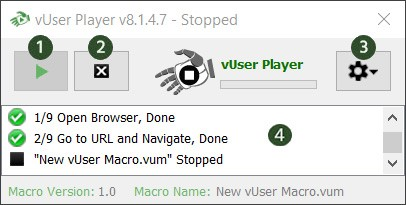
Pause Button of the Player Application
When the Player begins to run a Macro file, the Running window will be displayed.
This window has three buttons. The first one
( )
is used to pause the execution of the macro. The second one
(
)
is used to pause the execution of the macro. The second one
( )
can be used to stop the execution completely. And the third one
(
)
can be used to stop the execution completely. And the third one
( )
will open the setting menu.
)
will open the setting menu.
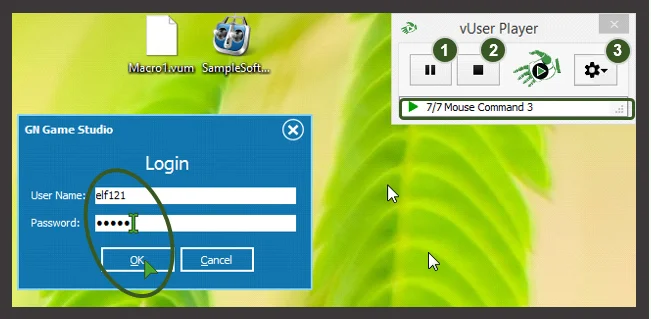
Stop Button of the Player Application
When the Player begins to run a Macro file,
the Running window will be displayed.
This window has three buttons. The first one
( )
is used to pause the execution of the macro. The second one
(
)
is used to pause the execution of the macro. The second one
( )
can be used to stop the execution completely. And the third one
(
)
can be used to stop the execution completely. And the third one
( )
will open the settings menu.
)
will open the settings menu.

Setting Button of the Player Application
By clicking on this button, you’ll have access to some of the configurations of the Player application.
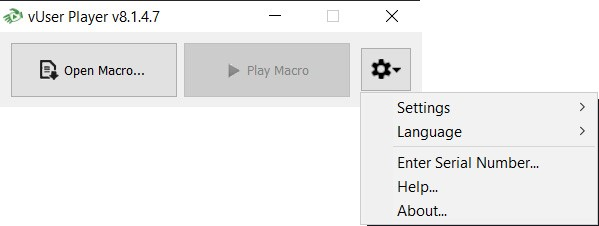
Pause-Play Button of the Player Application
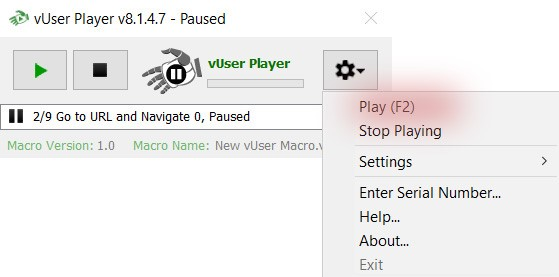
While the Macro is running, the Player application handles the movements of the mouse; therefore, if you want to do something else, you need to select the “Pause” button or click on the F2 key on your keyboard. Once you’ve finished performing your other task, you can use the same F2 key (Play) to continue the execution of the Macro.
Stop Playing of the Player Application
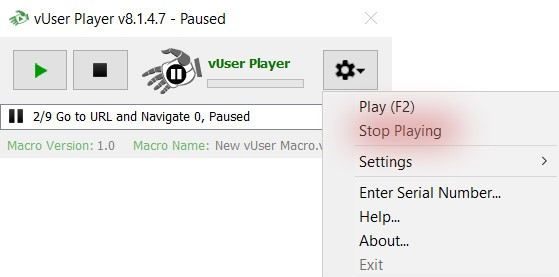
While the Macro is running, if you want to completely stop the execution, you can select this option.
Help Button of the Player Application
Clicking on this item will open the Help file of the application.

Enter Serial Number Menu
If you select this option, a window will open, and you can enter the serial number of the application. Once you’ve made the purchase, you will have access to the serial number from the Profile section.

About window of the Player application

If you select this option, the following window will appear, which has some information about the current version of the application.

Exit the Player Application
If you select this option, the Player will stop the execution of the Macro and immediately closes.
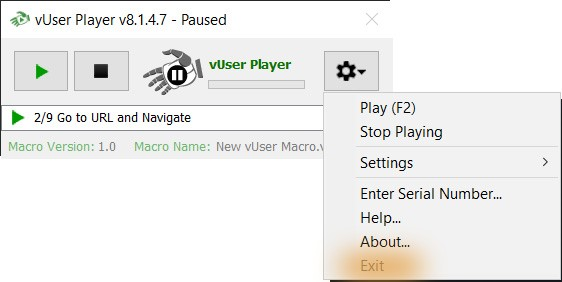
Stay on Top (This Window)
If you want to see the Player at all times and view the reports of action executions, you can select this option from the Setting Menu.

Drag & Drop
An easy way to open and run the Macros is to drag them and drop them on the Player application. By doing this, the Player application opens and starts running the Macro.
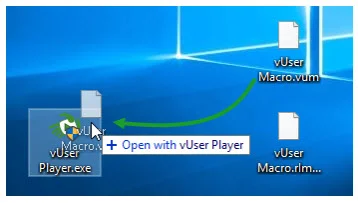
Shortcuts
In this method, first, you need to create a shortcut of the Player application in the location that you want. To create a shortcut, all you need to is to right-click on the “vUser Plaer.exe” file and click on “Create shortcut.” Then, once the shortcut has been created, you can right-click on it and select “Properties.” In the window that opens, you need to append the name of the Macro to the end of the “Target location:
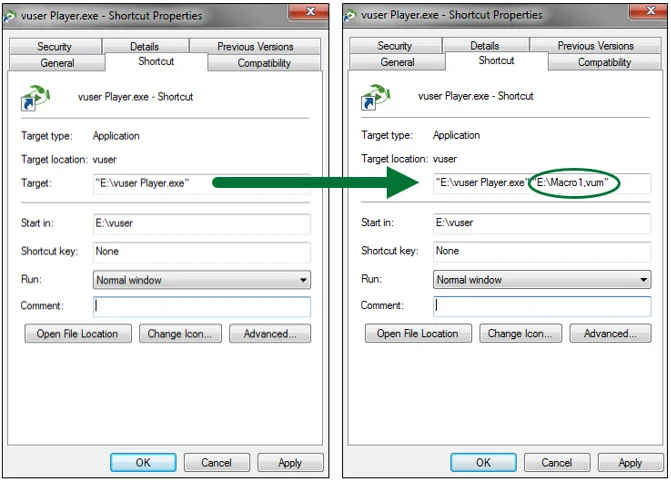
Autorun
If you have built an autorun and you want to run the Macro by clicking on one its buttons, once you’ve specified the location of the Player application, you can use this command to run the Macro that you want:
Sample command:
vum: "D:\vUser Macro 1.vum"
In the following image, you can see how this is done in the  application, which is used to build autoruns.
application, which is used to build autoruns.
